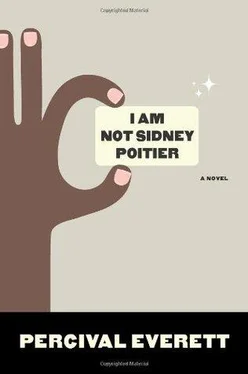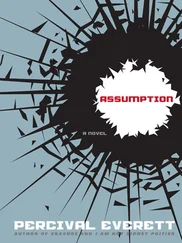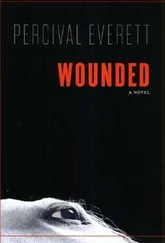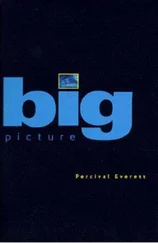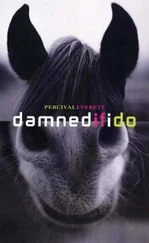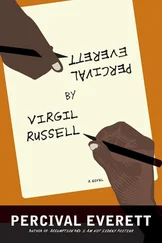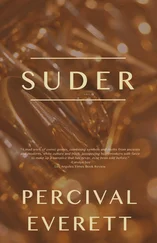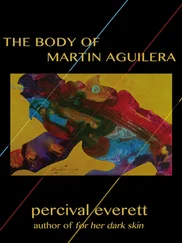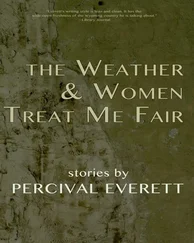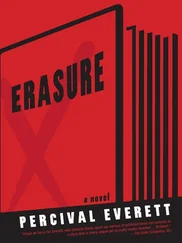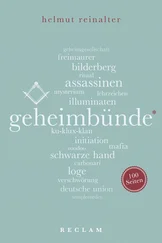
Morris Chesney belonged to a fraternity. Natch, as my mother would probably have said. He asked me that third day, at the end of the silent treatment, after his cronies had left, if I might be interested in pledging. I had no idea what he was talking about and I think what I said was, “What are you talking about?”
“How would you like to be an Omega?” he asked.
“?”
“You really are a nerd, aren’t you?” he said. “I’m asking if you want to join my fraternity, Omega Psi Phi.”
“Why would I?” I asked, but not in a snide way.
“We have great parties for one thing. Bitches will sleep with frat men, especially Omegas. And business connections after college. One brother got a job making six figures right out of school.”
“What would I have to do?”
“Not much.”
That sounded so much like a lie that I wanted to believe him. This was when my life again became essentially a wildlife film, in the way that it worked itself out as something of a vast morality play, where the strong survive and the maintenance of social conventions seems the most certain and steadiest hedge against the harsh and unforgiving environment.
The mammals in the fraternity employed a kind of moral biology. If ugly and cruel, it was at least consistent. I showed up with Morris at the frat house, not a dorm but a hovel where they met to drink, and, I was told, have wanton sex with any willing and drunk woman. The members wore black robes and held staves. Candles, black and white, burned in every corner. And there seemed to be a constant humming, like chanting, but I couldn’t hear or see that any of them were making the sounds. It all made for bad music. They talked rather nicely to the seven of us standing in that poorly dressed living room, and then, after we seven agreed that we would be pledging, they shouted and made as if to punch us. They did punch one guy who failed to flinch with appropriate fear. After that he flinched as well as the rest of us. Morris Chesney was one of the bigwigs, strutting around in his dark glasses and red beret and casting an especially mean eye at me.
A tall man whom we were instructed to refer to as Big Boss addressed us as a unit. He said, “You are going to cross the sands. You are not yet black enough to be Omegas, but you will burn under the sun on this, our terrain. If you are man enough you will make it across and be made right.” He turned to Morris. “Isn’t that right, Big Brother Chesney?”
“Right you are, Brother Benson.”
This hazing business wasn’t going to get started too quickly. I knew that. Too harsh too fast and the lot of us, dumb and smart alike, would have called it quits. No, they wanted us to invest some energy and time. They were simply what nature had made them, small bullies. And yet, there I was, more fool me, because I wanted the college experience.
I could see immediately that Morris Chesney wanted me to fail, a blind man could have seen that, but not too quickly, because as long as I was pledging and was subject to their commands I was essentially out of our dormitory room. I was required to wear a red T-shirt, the same one at all times, without washing or rinsing it, though I was allowed to bathe every other day.
At the first meeting of Professor Everett’s class, he walked by me, observed my red T-shirt, smiled, and said, “Baaaa.”
Ted was equally unimpressed. He said, “A fraternity? Hell, why didn’t you just go to LSU or some damn place? Have you ever seen a badger? They’re kinda like little bears.”
I had a vague understanding of their disappointment, but I wanted the full cliché college experience. In fact, I even attended the convocation in King Chapel, red T-shirt and all. There a short round vice president of something or other stood to address all of us, at least all of us who attended, and that turned out to be a small fraction of the student body. His name was Dudley Feet and so had to be in some way related to Gladys Feet. How many Feet could there be? There were at least two. He rose to the lectern and cleared his throat for about ten minutes, cast an eye about, no doubt counting the empty seats that so greatly outnumbered the scattered attendees.
He said, “Men, special men, men of our race, men of our future, our future men, our future, manly men, men men, Morehouse men, we gather here today to celebrate a mission, a mission that has produced the likes of the Doctor Reverend Martin Luther King Junior and Edwin Moses, Maynard Jackson and Spike Lee, Howard Thurman and Samuel L. Jackson. These men are more than graduates, they are alumni. This is more than a college, it is an institution. We gather here today on this the beginning of a new academic year to join our spirits and minds together, to move them in one fluid and forward motion toward that great good that is our mission and legacy here at Morehouse. We are called the Harvard of the South, but we here at Morehouse know that Harvard is the Morehouse of the North. You will be tested here on these grounds, tested for what life will throw at you. I ask you to recall the Book of Psalms, sixty-six, ten through twelve: ‘For Thou has tested us O Lord; Thou has tried us as silver is tried. Thou didst bring us into the net, Thou didst lay affliction on our loins, Thou didst let men ride over our heads. We have gone through the fire and through the water; Yet Thou has brought us forth to a spacious place.’ We ask what it means that silver is tried. It means that silver was tried, and it was not as good as gold. That’s what that means. And you wonder what the psalm means when it addresses the affliction that has been laid on our loins and I will tell you what it means: it means leave those girls alone and you know the ones I mean or else men will ride over your heads. We will cross the desert together, our naked toes sinking luxuriously into the hot loose sand, our naked backs darkening beneath the hammering of the eternal sun, our sweat mixing, our blood boiling and becoming one, our voices lifting into one great instrument, our manhood rising into one massive thrust against the oppression that rides us!” Feet was sweating now, though the only rise he had gotten out of his audience was a shifting to become more comfortable and the exit of two students who had wisely seated themselves by the door. “I am pleased today to present our guest speaker. You all know him. He has done much to uplift the race. He was the first black man on television to carry a gun. He is a gentleman, an actor, a comedian, an author, and above all else, an educator. You all know him from television, but we know him as a friend. Students, Doctor William H. Cosby Junior.”
There was an enthusiastic welcome. In fact there was more applause than seemed possible from the audience that I had roughly counted. And when I looked again, the empty seats had been filled, including the one next to me, which had been filled with a smiling Morris Chesney. The smile was a bad sign. After only a week in college I was able to deduce that much.
“Sit on the floor,” he said.
“What?”
“Big Brother Morris says sit on the floor, you pimple.”
I stood, folded up my chair seat, and dropped my stupid ass to the sticky floor. Why? Because Big Brother Morris had said so, and I had entered into this social system willingly for some reason and felt strangely compelled to abide by its rules. I sat, my sight just cresting the level of the seat back in front of me.
Cosby fumbled with a fat unlit cigar and adjusted his dark glasses. “You men think I’m going to take it easy on you. You think because you’re in college and sitting here in khakis and loafers that I’m all right with you. You think that because you’re not bopping your heads to rap music while sitting here that I’m going to embrace you. You’re wrong. You’re all pathetic. You’re pathetic until you’re not pathetic, until you do something strong and good and not until you do that. You think because you probably won’t be clad in an orange jumpsuit for stealing a piece of pound cake that I feel all warm and fuzzy about you. I sell Pudding Pops for the white man. I don’t know why I’m saying that, but I am. I make myself sick, but the white man is not to blame. He didn’t put the gun in the hands of the black kid down in juvenile hall. No, his missing father put it there. Pound cake. I’m on television. Black girls have babies by three or four fathers and why? Pudding Pops! That’s what I’m saying. Some of you are probably wondering how I can stand up here, call me high and mighty, talking about how I can stand here when I’m being sued for having babies with a woman other than my wife. Well, hell, I can afford to have babies. Pudding Pops! If you don’t know who your children’s friends are, then you’re not doing your job. Some of you have probably fathered children already. Babies having babies. Pound cake. Did you know that black girls graduating from high school outnumber men seventy to thirty? Where are these educated, fine young women going to find suitable partners? That’s why I have some babies on the side. Pudding Pops! Pants down around their cracks. What’s wrong with them? There’s something wrong with these people. When you put your clothes on backwards, there’s something wrong. Fifty percent dropout rate. Where are the parents? What kind of parents will you be? That’s the test. What kind of parents are you now? I’ve been on television since nineteen sixty-two. I kissed a Japanese woman on screen in nineteen sixty-six and managed not to have a baby with her. I want to thank you for having me here today, and I want you to know I will be more than happy to sign copies of my book, Fatherhood, which is on sale just outside at an attractive discount. Believe me, you need to read it. Thank you.”
Читать дальше
